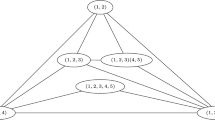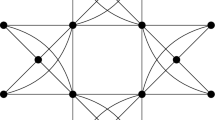Abstract
The isomorphism problem for groups, when the groups are given by their Cayley tables is a well-studied problem. This problem has been studied for various restricted classes of groups. Kavitha gave a linear time isomorphism algorithm for abelian groups (JCSS 2007). Although there are isomorphism algorithms for certain nonabelian group classes represented by their Cayley tables, the complexities of those algorithms are usually super-linear. In this paper, we design linear and nearly linear time isomorphism algorithms for some nonabelian groups. More precisely,
-
We design a linear-time algorithm to factor Hamiltonian groups. This allows us to obtain an \(\mathcal {O}(n)\) algorithm for the isomorphism problem of Hamiltonian groups, where n is the order of the groups.
-
We design a nearly linear time algorithm to find a maximal abelian direct factor of an input group. As a byproduct we obtain an \(\tilde {\mathcal {O}}(n)\) isomorphism for groups that can be decomposed as a direct product of a nonabelian group of bounded order and an abelian group, where n is the order of the groups.
-
We observe that testing normality, computing the center of a group, finding a logarithmic sized generating set, computing quotient groups for groups given by their Cayley table could be done in linear or nearly linear time.
Similar content being viewed by others
Notes
For the design of subquadratic deterministic algorithms for group theoretic problems where the groups are given by their Cayley table it is standard to assume that the inputs are indeed Cayley tables of groups and not just some arbitrary data [6, 13, 23, 24] (See the Model of Computation in Section 2).
A group G is nilpotent class 2 if G/Z(G) is abelian.
We can compute the Sylow decomposition in \(\mathcal {O}(|G|)\) without using the result given [6], if G is Hamiltonian 2-group. Note that in a Hamiltonian 2-group order of each non-trivial element will be either 2 or 4.
References
Arvind, V., Torán, J: Solvable group isomorphism is (almost) in NP ∩ coNP. ACM Transactions on Computation Theory 2(2), 4:1–4:22 (2011)
Babai, L., Qiao, Y.: Polynomial-time isomorphism test for groups with abelian sylow towers. In: STACS’12 (29th Symposium on theoretical aspects of computer science), 14, pp 453–464, LIPIcs (2012)
Babai, L., Codenotti, P., Qiao, Y.: Polynomial-time isomorphism test for groups with no abelian normal subgroups - (extended abstract). In: Automata, languages, and programming - 39th international colloquium, ICALP 2012, warwick, uk, july 9-13, 2012, proceedings, part I, pp 51–62 (2012), https://doi.org/10.1007/978-3-642-31594-7_5
Boppana, R.B., Hastad, J., Zachos, S.: Does co-np have short interactive proofs?. Inf. Process. Lett. 25(2), 127–132 (1987)
Carmichael, R.D.: Introduction to the theory of groups of finite order. GINN and Company, Oxford (1937)
Chen, L., Fu, B.: Linear and sublinear time algorithms for the basis of abelian groups. Theor. Comput. Sci. 412(32), 4110–4122 (2011)
Das, B., Sharma, S.: Nearly linear time isomorphism algorithms for some nonabelian group classes. In: International computer science symposium in Russia, pp 80–92, Springer (2019)
Gall, F.L.: Efficient isomorphism testing for a class of group extensions. In: 26th International symposium on theoretical aspects of computer science, STACS 2009, February 26-28, 2009, Freiburg, Germany, Proceedings, pp 625–636 (2009)
Garzon, M., Zalcstein, Y.: On isomorphism testing of a class of 2-nilpotent groups. J. Comput. Syst. Sci. 42(2), 237–248 (1991)
Grochow, J.A., Qiao, Y.: Algorithms for group isomorphism via group extensions and cohomology. SIAM J. Comput. 46(4), 1153–1216 (2017)
Holt, D.F., Eick, B., O’Brien, E.A.: Handbook of computational group theory. Chapman and Hall/CRC, Florida (2005)
Hungerford, T.W.: Algebra, volume 73 of graduate texts in mathematics. Springer-Verlag, New York (1980)
Karagiorgos, G., Poulakis, D.: Efficient algorithms for the basis of finite abelian groups. Discrete Mathematics, Algorithms and Applications 3 (04), 537–552 (2011)
Kayal, N., Nezhmetdinov, T.: Factoring groups efficiently. In: International colloquium on automata, languages, and programming, pp 585–596, Springer (2009)
Luks, E.M.: Lectures on polynomial-time computation in groups. University of Oregon. Department of Computer and Information Science, Eugene (1990)
Miller, G.L.: On the \(n^{\log n}\) isomorphism technique (a preliminary report). In: Proceedings of the tenth annual ACM symposium on theory of computing, pp 51–58, ACM (1978)
Qiao, Y-M, Sarma, J., Tang, B-S: On isomorphism testing of groups with normal hall subgroups. J. Comput. Sci. Technol. 27(4), 687–701 (2012)
Rajagopalan, S., Schulman, L.J.: Verification of identities. SIAM J. Comput. 29(4), 1155–1163 (2000)
Rosenbaum, D.J.: Breaking the \(\mathcal {O}(n \log n)\) barrier for solvable-group isomorphism. In: Proceedings of the twenty-fourth annual ACM-SIAM symposium on discrete algorithms, pp 1054–1073, Society for industrial and applied mathematics (2013)
Rosenbaum, D.J., Wagner, F.: Beating the generator-enumeration bound for p-group isomorphism. Theor. Comput. Sci. 593, 16–25 (2015)
Savage, C.D.: An \(\mathcal {O}(n^2)\) algorithm for abelian group isomorphism. Computer Studies [Program], North Carolina State University (1980)
Seress, A., Seress, A.: Permutation group algorithms, vol. 152. Cambridge University Press, Cambridge (2003)
Telikepalli, K.: Linear time algorithms for abelian group isomorphism and related problems. J. Comput. Syst. Sci. 73(6), 986–996 (2007)
Vikas, N.: An \(\mathcal {O}(n)\) algorithm for abelian p-group isomorphism and an \(\mathcal {O}(n \log n)\) algorithm for abelian group isomorphism. J. Comput. Syst. Sci. 53(1), 1–9 (1996)
Wilson, J.B.: Finding direct product decompositions in polynomial time (2010)
Wilson, J.B.: Existence, algorithms, and asymptotics of direct product decompositions, i. Groups-Complexity-Cryptology 4(1), 33–72 (2012)
Author information
Authors and Affiliations
Corresponding author
Additional information
Publisher’s Note
Springer Nature remains neutral with regard to jurisdictional claims in published maps and institutional affiliations.
This article belongs to the Topical Collection: Special Issue on Computer Science Symposium in Russia (2019)
Guest Editor: Gregory Kucherov
A preliminary version of this article appeared in [7] .The current version is self-contained with the proofs of several propositions being added or rewritten along with reorganizations of some sections.
Rights and permissions
About this article
Cite this article
Das, B., Sharma, S. Nearly Linear Time Isomorphism Algorithms for Some Nonabelian Group Classes. Theory Comput Syst 65, 497–514 (2021). https://doi.org/10.1007/s00224-020-10010-z
Accepted:
Published:
Issue Date:
DOI: https://doi.org/10.1007/s00224-020-10010-z




